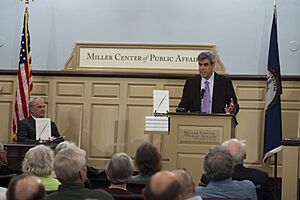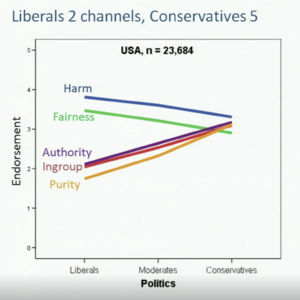Jonathan Haidt facts for kids
Quick facts for kids
Jonathan Haidt
|
|
|---|---|

Haidt in 2012
|
|
| Born | October 19, 1963 New York City, U.S.
|
| Education | Yale University (BA) University of Pennsylvania (MA, PhD) |
| Known for |
|
|
Notable work
|
The Happiness Hypothesis (2006) The Righteous Mind (2012) The Coddling of the American Mind (2018) The Anxious Generation (2024) |
| Awards | Templeton Prize in Positive Psychology (2001) American Academy of Arts and Sciences (2019) |
| Scientific career | |
| Fields | Social psychology Moral psychology |
| Institutions | University of Chicago University of Virginia New York University |
| Thesis | Moral judgment, affect, and culture, or, is it wrong to eat your dog? (1992) |
| Doctoral advisor | Jonathan Baron Alan Fiske |
Jonathan David Haidt (born October 19, 1963) is an American social psychologist and author. He teaches about ethical leadership at New York University Stern School of Business. Haidt mostly studies the psychology of morality and moral emotions. This means he looks at how people decide what is right or wrong and how their feelings play a part.
One of Haidt's biggest ideas is the moral foundations theory. This theory suggests that our ideas about right and wrong come from natural, gut feelings, not just from logic. He believes these feelings developed over time. This theory also helps explain why people with different political views often have different ideas about what is moral.
Haidt has written several books for everyone, not just scientists. These include The Happiness Hypothesis (2006), which connects old philosophies with new science. The Righteous Mind (2012) talks about how our morals affect politics. The Coddling of the American Mind (2018) discusses why people's political views are becoming more extreme and how this affects mental health. His 2024 book, The Anxious Generation, argues that smartphones and very protective parenting have changed childhood and led to more mental health challenges.
Contents
About Jonathan Haidt
Early Life and Education
Jonathan Haidt grew up in Scarsdale, New York. His grandparents came to the United States from Russia and Poland. Haidt became an atheist by age 15. His father was a lawyer, and his family generally held liberal political views.
When he was 17, Haidt started thinking deeply about life's big questions after reading a play called Waiting for Godot. He went to Yale University and earned a degree in philosophy in 1985. After working as a computer programmer for a short time, he studied psychology at the University of Pennsylvania. He earned his master's and PhD degrees there in 1988 and 1992. His main project for his PhD was about how culture and feelings affect moral judgments.
After his studies, Haidt continued to research cultural psychology at the University of Chicago. He also traveled to India to study how people there thought about morality.
Academic Career and Teaching
In 1995, Haidt became a professor at the University of Virginia. He was a popular teacher and won several awards for his teaching. During this time, he studied how emotions like disgust and elevation (a feeling of being inspired by good actions) connect to morality. This research led to his book The Happiness Hypothesis in 2006.
Haidt also became interested in positive psychology, which studies what makes people happy and thrive. In 2004, he started looking at how moral psychology could explain political differences. This work led to his 2012 book, The Righteous Mind.
In 2011, Haidt moved to New York University Stern School of Business to teach about ethical leadership. He also helped start Ethical Systems, a group that shares research on ethics with businesses. In 2015, he co-founded Heterodox Academy. This group works to encourage different viewpoints and respectful discussions, especially in universities.
Key Ideas and Research
Jonathan Haidt's research has greatly influenced how we understand morality. Here are some of his main ideas.
Moral Disgust
Haidt studied the emotion of disgust. He found that disgust started as a way to protect us from bad food. But over time, it also became a feeling that helps us protect our bodies and our social rules. For example, we might feel disgust towards actions we see as morally wrong.
Moral Elevation
Haidt also explored the feeling of elevation. This is a warm, calm feeling you get when you see someone do something very kind or morally beautiful. It makes you want to be a better person yourself. He found that this feeling can even affect physical things, like increasing milk production in breastfeeding mothers.
Social Intuitionism
One of Haidt's most important ideas is the social intuitionist model. This model suggests that our moral judgments usually come from quick, automatic feelings, not from careful thinking. We often use our reasoning later to find reasons to support what our gut feeling already told us. It's like our emotions are the "dog" and our reasoning is the "tail" that follows.
Moral Foundations Theory
Building on his social intuitionist model, Haidt developed the moral foundations theory. This theory says that there are at least five basic moral "tastes" or foundations that all cultures use to build their ideas of right and wrong. Just like we have taste buds for sweet or sour, we have moral foundations for:
- Care/harm: Protecting others from harm.
- Fairness/cheating: Making sure things are fair.
- Loyalty/betrayal: Being true to your group.
- Authority/subversion: Respecting rules and leaders.
- Sanctity/degradation: Keeping things pure and sacred.
Haidt and his team later added a sixth foundation: Liberty/oppression (freedom versus being controlled). He suggests that different political groups prioritize these foundations differently. For example, liberals often focus more on care and fairness, while conservatives tend to value all six foundations more equally.
"The Elephant and the Rider"
Haidt uses a helpful metaphor to explain how our automatic feelings and conscious thoughts work together. He says our mind is like an elephant and a rider. The elephant represents our strong, automatic feelings and intuitions. The rider represents our conscious thoughts and reasoning. The rider can try to guide the elephant, but the elephant is much bigger and stronger. This means our feelings often lead the way, and our thoughts try to make sense of where we're going.
Views on Politics
Haidt has studied political psychology to understand why people have different political views. He believes that all major political groups—conservatives, progressives, and libertarians—have important ideas. He thinks that the best solutions come from different ideas being discussed.
Haidt describes himself as a political centrist, meaning he holds views that are in the middle of the political spectrum. He has worked to reduce political polarization in the United States, which is when people with different political views become very divided and unwilling to understand each other. He helped create CivilPolitics.org, a website that shares research on how to be more civil in politics. He also advises groups like RepresentUs and Braver Angels, which work to bring people together across political divides.
In a 2011 TED Talk, Haidt explained that liberals and conservatives have different values. He also pointed out that fields like psychology might sometimes have biases against conservative viewpoints.
Books by Jonathan Haidt
The Happiness Hypothesis
The Happiness Hypothesis: Finding Modern Truth in Ancient Wisdom (2006) looks at old philosophical ideas about happiness. It then compares these ideas with what modern science tells us. The book explores ten "Great Ideas" from thinkers like Plato and Buddha and discusses how they can apply to our lives today.
The Righteous Mind
The Righteous Mind: Why Good People Are Divided by Politics and Religion (2012) builds on Haidt's Moral Foundations Theory. It argues that our moral judgments come from gut feelings, not just logic. The book explains why liberals, conservatives, and libertarians often disagree because they value different moral foundations.
The Coddling of the American Mind
The Coddling of the American Mind: How Good Intentions and Bad Ideas Are Setting Up a Generation for Failure (2018), co-written with Greg Lukianoff, explores changes in college culture and how they affect mental health. It also looks at how childhood has changed, including more "fearful parenting" and the impact of social media.
The Anxious Generation
The Anxious Generation: How the Great Rewiring of Childhood Is Causing an Epidemic of Mental Illness (2024) examines how modern technology and parenting styles affect children's mental well-being. Haidt suggests that the rise of smartphones and overprotective parenting have changed how children grow up. He argues that these changes have led to more mental health challenges among young people.
See also
 In Spanish: Jonathan Haidt para niños
In Spanish: Jonathan Haidt para niños
 | Sharif Bey |
 | Hale Woodruff |
 | Richmond Barthé |
 | Purvis Young |



